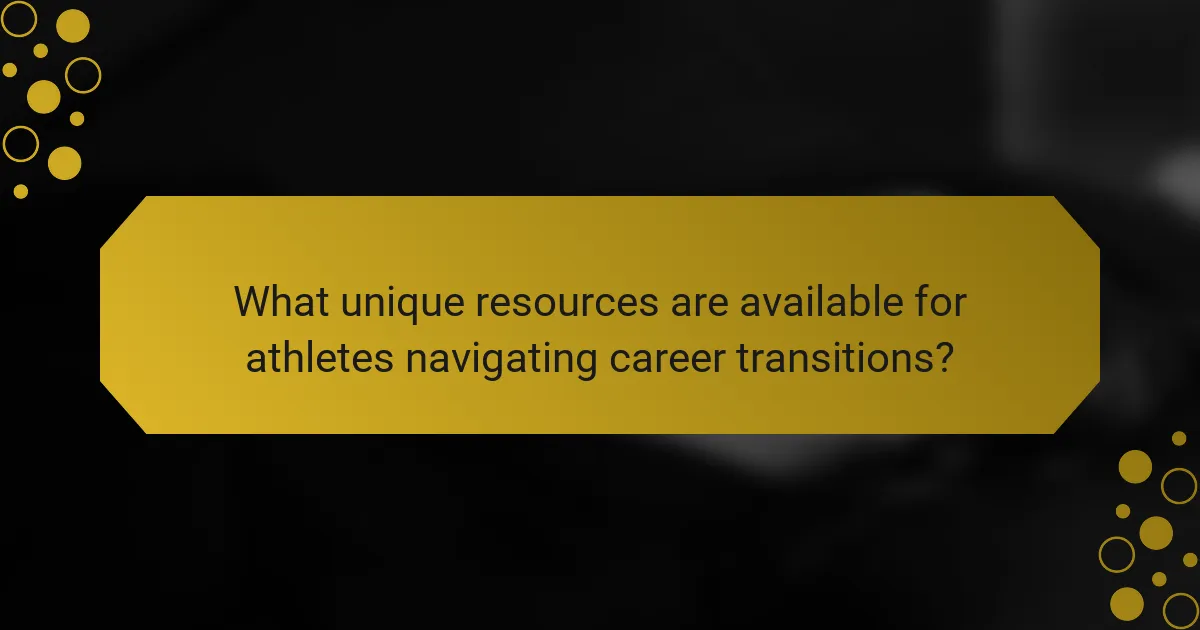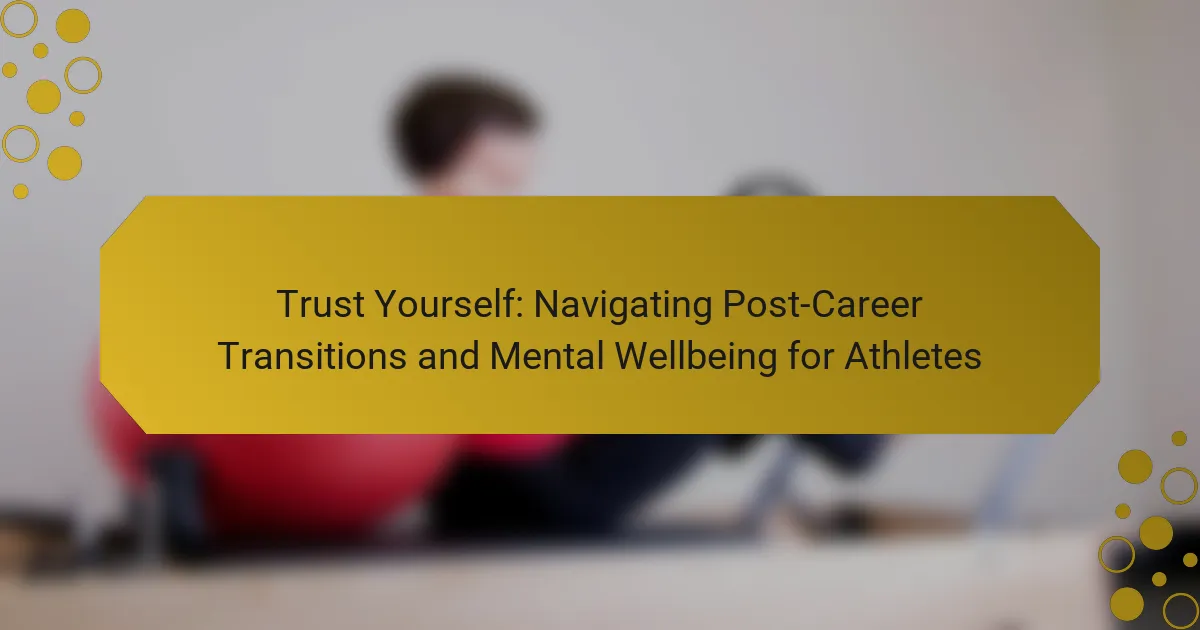Navigating post-career transitions can be challenging for athletes, often leading to identity loss and mental health issues. This article explores strategies for enhancing mental wellbeing, the importance of a support network, and resources available for career development. It emphasizes the role of self-trust, goal-setting, and mindfulness in adapting to life after sports. Understanding these aspects is crucial for fostering resilience and finding new purpose.

What are the key challenges athletes face during post-career transitions?
Athletes face significant challenges during post-career transitions, including identity loss, financial instability, and mental health issues. Many struggle to redefine their self-worth outside of sports. Financial challenges arise from managing savings and career transitions. Mental health concerns, such as anxiety and depression, are common due to the abrupt lifestyle changes and loss of routine. Establishing a support network and seeking professional guidance can help navigate these challenges effectively.
How does identity loss impact mental health after sports?
Identity loss significantly impacts mental health after sports, leading to feelings of anxiety and depression. Athletes often struggle with the transition to life beyond competition, as their self-worth may have been tied to their athletic identity. This shift can cause a sense of emptiness and confusion about their purpose. Research indicates that 40% of retired athletes experience mental health challenges, highlighting the need for effective support systems. Addressing these issues through counselling and community engagement can promote resilience and well-being in this vulnerable transition phase.
What financial considerations should athletes keep in mind?
Athletes should prioritize financial planning, budgeting, and investment strategies post-career. Transitioning from a structured income to financial independence requires awareness of expenses, potential income sources, and long-term savings. Understanding the impact of retirement funds, endorsements, and business ventures is crucial. Athletes should consult financial advisors to create tailored plans that secure their financial future.
What are the best practices for financial planning post-career?
To effectively navigate financial planning post-career, athletes should prioritize self-trust and mental wellbeing. Establish a budget that reflects new income realities, focusing on essential expenses. Engage with financial advisors to create a diversified investment strategy. Maintain an emergency fund to cover unforeseen expenses, ideally three to six months’ worth of living costs. Explore opportunities for continued engagement in sports, such as coaching or mentoring, to maintain a sense of purpose and community. Regularly review financial goals to adapt to changing circumstances and ensure long-term stability.
How can athletes maintain social connections after retirement?
Athletes can maintain social connections after retirement by engaging in community activities and leveraging their existing networks. Participating in local sports clubs fosters camaraderie and shared experiences. Networking events tailored for former athletes can provide valuable connections. Online platforms and social media groups dedicated to retired athletes can facilitate ongoing interactions. Volunteering in youth sports programmes allows athletes to share their expertise while building relationships. Establishing regular meet-ups with former teammates or peers can strengthen bonds and support mental wellbeing during the transition.

What universal strategies promote mental wellbeing for retired athletes?
Retired athletes can enhance mental wellbeing through strategies like self-trust, social support, and goal-setting. Building a strong support network fosters connections and reduces feelings of isolation. Engaging in new pursuits or hobbies provides a sense of purpose and fulfilment. Additionally, practicing mindfulness and self-reflection can improve emotional resilience. Regular physical activity remains crucial, as it boosts mood and cognitive function.
What role does physical activity play in mental health maintenance?
Physical activity significantly enhances mental health by reducing anxiety, depression, and stress. Engaging in regular exercise promotes the release of endorphins, which improve mood and overall well-being. For athletes transitioning after their careers, maintaining a routine of physical activity can provide structure and a sense of purpose, essential for mental stability. Studies show that those who remain active post-retirement report higher levels of satisfaction and lower instances of mental health issues.
How can mindfulness practices support emotional resilience?
Mindfulness practices enhance emotional resilience by fostering self-awareness and reducing stress. Techniques such as meditation, deep breathing, and mindful movement help athletes process emotions during post-career transitions. These practices cultivate a deeper connection to one’s thoughts and feelings, enabling better emotional regulation. Research indicates that regular mindfulness practice can significantly lower anxiety and improve overall mental wellbeing, making it a valuable tool for athletes navigating life changes.

What unique resources are available for athletes navigating career transitions?
Athletes can access unique resources like mentorship programmes, career coaching, and mental health support to navigate transitions. These resources focus on enhancing mental wellbeing and building new skills. Organisations like the Professional Athletes Foundation offer tailored workshops that address post-career challenges. Networking events provide opportunities to connect with industry professionals, fostering career development. Additionally, online platforms offer courses that help athletes transition into various fields, enhancing their employability.
What programmes exist to assist athletes in finding new career paths?
Athletes can access various programmes designed to assist in career transitions. These include career counselling services, mentorship programmes, and workshops focused on skills development. Organisations such as the Professional Athletes Foundation and the NFL Players Association offer tailored resources to aid athletes in navigating post-career opportunities. Additionally, universities often provide alumni networks and career fairs specifically for former athletes, enhancing their job search.
How can mentorship play a role in post-career planning?
Mentorship significantly aids athletes in post-career planning by providing guidance and emotional support. Experienced mentors help athletes navigate transitions, leveraging their insights to build confidence and explore new opportunities. This relationship fosters mental wellbeing, as mentors can share strategies for coping with identity shifts and stress. Ultimately, mentorship enhances an athlete’s ability to trust themselves in unfamiliar environments.

What rare attributes influence mental health outcomes for retired athletes?
Rare attributes influencing mental health outcomes for retired athletes include social support networks, identity transition challenges, and coping mechanism development. These factors significantly affect mental wellbeing during post-career transitions. Social support can mitigate feelings of isolation, while identity challenges may lead to anxiety. Effective coping strategies are crucial for adapting to life after sports.
How does the athlete’s sport type affect their transition experience?
The athlete’s sport type significantly influences their transition experience. Individual sports often require athletes to develop strong self-reliance, while team sports emphasize collaboration and shared identity.
Individual athletes may face challenges like isolation during transitions, as they often lack a built-in support network. In contrast, team athletes can benefit from camaraderie and shared experiences, which can ease the adjustment process.
Moreover, the physical demands of different sports can impact mental wellbeing post-career. High-contact sports may lead to a greater prevalence of injuries, affecting an athlete’s confidence and mental health during transitions.
Ultimately, understanding these dynamics can help athletes navigate their post-career journeys more effectively, fostering resilience and promoting mental wellbeing.
What are the long-term psychological effects of early retirement?
Long-term psychological effects of early retirement can include feelings of loss, identity crisis, and decreased mental wellbeing. Athletes may struggle with transitioning from a defined career to an uncertain future. Studies indicate that a lack of structured daily routines can lead to increased anxiety and depression. Engaging in new activities and establishing social connections can mitigate these effects, promoting a healthier post-career transition.

What actionable steps can athletes take to ensure a smooth transition?
Athletes can ensure a smooth transition by focusing on mental wellbeing and self-trust. First, develop a clear post-career plan that outlines goals and potential career paths. Engage in self-reflection to understand personal strengths and interests. Build a support network of peers, mentors, and professionals who can provide guidance. Prioritise mental health through practices such as mindfulness, therapy, or counselling. Lastly, embrace continuous learning to adapt to new challenges and opportunities.
What common mistakes should athletes avoid during their transition?
Athletes should avoid underestimating the importance of mental health and neglecting their support systems during transitions. Common mistakes include not seeking professional guidance, failing to establish new goals, and resisting change. These oversights can lead to increased anxiety and feelings of isolation. Emphasising self-trust and adaptability is crucial for successful navigation of this challenging phase.
How can athletes effectively set and achieve post-career goals?
Athletes can effectively set and achieve post-career goals by leveraging their skills and experiences. First, they should identify interests and strengths outside sports. Next, they can create a structured plan with specific, measurable, achievable, relevant, and time-bound (SMART) goals. Networking with former athletes and professionals in desired fields can provide valuable insights and opportunities. Regularly evaluating progress and adjusting goals as needed fosters resilience and adaptability. Lastly, maintaining mental wellbeing through mindfulness practices supports sustained motivation and focus.
What tools can help track progress towards new objectives?
To track progress towards new objectives, athletes can utilise various tools. Goal-setting apps like Strides help monitor achievements. Journals encourage reflection on mental wellbeing. Wearable fitness trackers provide data on physical activity. Online communities offer support and accountability.
What expert insights can guide athletes in their post-career journey?
Athletes can navigate their post-career journey by trusting their instincts, seeking mentorship, and prioritizing mental wellbeing. Emphasizing self-awareness helps in recognizing transferable skills. Engaging in networking can provide opportunities and support. Developing a routine focused on physical and mental health is essential for a smooth transition. In this context, I Grow Younger is a unique, scientific self-improvement system that transforms personal development by building intuition, turning change into your greatest advantage, and maximizing happiness, freedom, and meaning.
